May 9, 2025 – 82nd Day of the 100-Day Dharma Talk , Friday Dharma Q&A, Book Launch for “Donghak Manri”
Hello. This is the 82nd day of Venerable Pomnyun Sunim’s 100-Day Dharma Talk. Today, a Friday Dharma Q&A session open to the general public is being held. A gentle spring rain has been falling all day in Seoul.

After completing his morning practice and meditation, Sunim headed to the Jungto Social and Cultural Center to conduct the Friday Dharma Q&A session. Volunteers had arrived early to welcome citizens who came to attend the Q&A.
At 10:15 AM, the YouTube livestream began, and everyone recited the Three Refuges and Words for Practice together. About 160 people were present in the audience, while approximately 3,700 viewers were connected to the YouTube livestream as the dialogue began.

During the hour and a half session, three people asked Sunim questions. One of them sought advice about her husband’s affair with a woman who had become pregnant, explaining that she still had feelings for her husband and wanted guidance on what to do.
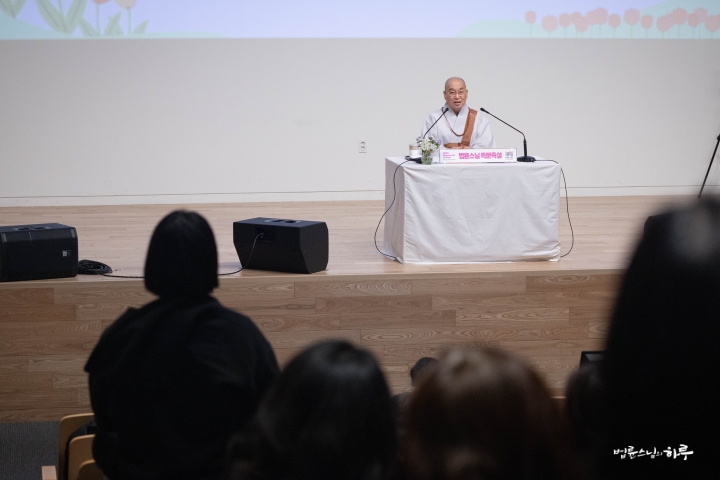
My husband had an affair a woman and even got her pregnant, what should I do?
“Do you and your husband have any children?”
“We’re in the process of IVF treatment.”
“What do you like about your husband?”
“He treated me well, and he’s just a really good person.”
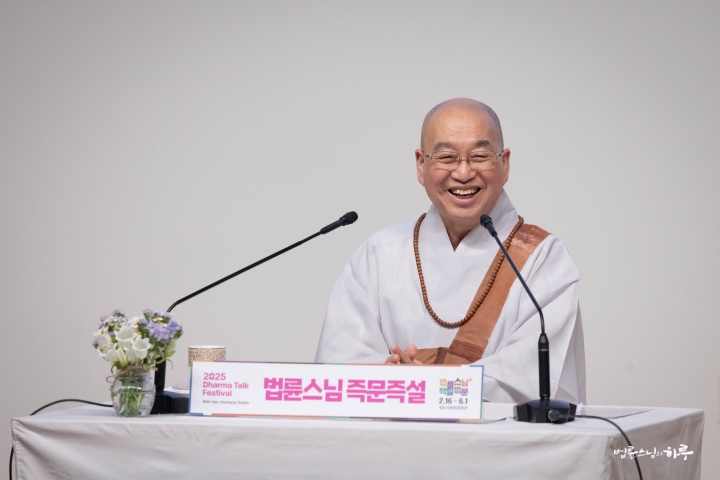
“When you say you like your husband because he treats you well, that might feel burdensome from his perspective. For example, if someone keeps giving me money and I say I like that, it becomes a burden for the giver. Similarly, if you say you like that your husband takes good care of you, he might feel pressured to continue doing so. Relationships where one person is expected to constantly accommodate the other don’t usually last long. Let’s consider the reverse situation. Even if I’m fine with taking care of someone, if it continues too long or if the demands become excessive, anyone would get tired. Even parents become exhausted when their adult children continue to depend on them emotionally and financially. Are there any financial issues in your marriage?”
“I do work, but I earn very little income. I’ve been financially dependent on my husband.”
“If your husband has always treated you well, you’ve been financially dependent on him, and you don’t have children together, then structurally, this relationship might have been difficult to sustain long-term. I completely understand why it’s hard for you to part with your husband. But from his perspective, his wife hasn’t given him children, hasn’t provided financial benefits, and he’s had to continuously accommodate her emotionally. Such relationships are difficult to maintain. Of course, from your perspective, this is very disappointing. It’s natural to feel an overwhelming sense of loss, similar to when parents who have always taken care of you suddenly pass away. You might also think it would be difficult to find another man like him. In fact, when a husband has been exceptionally good to his wife during his lifetime, the wife often doesn’t remarry after he passes away. It’s like the saying, ‘A dead Zhuge Liang defeats a living Sima Yi’ – the deceased husband outshines all living men.
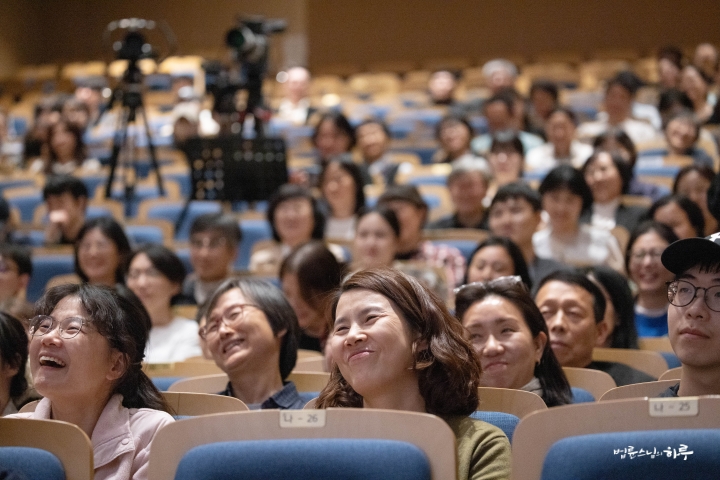
A relationship where one person is always accommodating doesn’t necessarily lead to positive outcomes. In fact, it can make problems more complicated, as in your current situation. For example, if your husband is incompetent, you’re supporting him financially, there are issues on his side preventing you from having children, and on top of that, he’s having an affair—how would you feel? You might think, “It’s unfortunate, but I’m actually better off without this troublesome relationship. You’ve created your own misfortune, what can I do?
The reason you’re suffering now is because you’ve received significant benefits from your husband over the years. That’s why you feel so devastated. However, you don’t necessarily need to agree to a divorce. If you still care for your husband and maintaining the current situation benefits you, you can simply leave things as they are. There’s no need to beg or cling to him. Just calmly tell him you don’t want a divorce and remain composed. Whether he maintains two households or not is his responsibility. Of course, he might raise issues or create conflicts. But the more you fight, the more distant your relationship becomes. This happens because he’s building new emotional connections elsewhere while your interactions are filled with tears and arguments. So instead, treat him warmly when he comes home. But be clear with your words.
“This problem arose because you met another woman, not because of anything I did wrong. You need to take responsibility. If you end that relationship and come back now, I won’t hold it against you anymore.”
If you maintain this comfortable yet firm stance, what might happen? Your divorce settlement could increase. If you’re going to separate anyway, you should receive as much compensation as possible. It’s foolish to be left alone crying and suffering when your husband has had an affair, fathered a child, and now wants to marry someone else. While you should acknowledge any factors that made it difficult for you to maintain this relationship long-term, ultimately, this situation was created by your husband, not you.
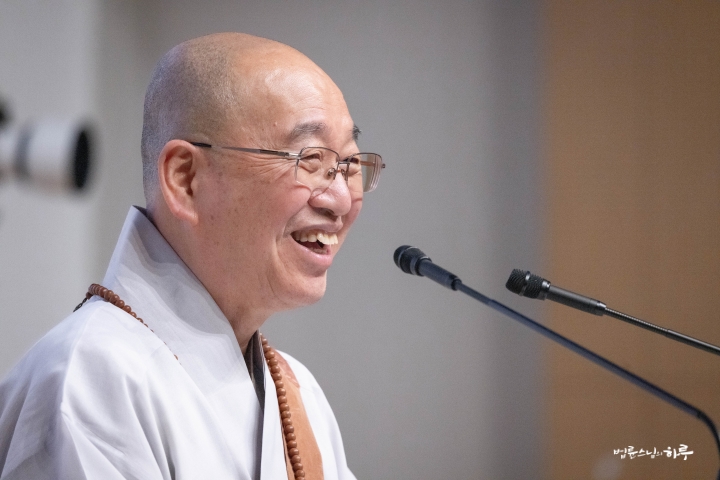
This doesn’t mean you deserve consequences because you did something wrong. Rather, it means you need to recognize that this relationship was inherently unsustainable from the beginning. You foolishly only saw the sweet parts without considering the pain that would eventually follow. It’s like continuously eating candy for its sweetness until you eventually face the pain of losing your teeth. So this situation isn’t about hating your husband, nor is it about past karma or punishment from heaven. It’s simply a natural outcome. You just didn’t realize that this situation was likely to happen from the start. Therefore, separating now isn’t strange at all.
The simplest approach would be to say, “Yes, I’ve enjoyed these happy 13 years with you. Thank you. Now let’s part ways!” This is the first method. The second is a more realistic and wise approach. While you bear responsibility for not foreseeing this situation, your husband should take moral responsibility for the relationship since you didn’t directly do anything wrong to him. This means recognizing that divorcing according to your husband’s wishes only benefits him. In this case, you would say to your husband:
“I forgive you. But I want to maintain our marriage. If you need a child, we can adopt or try IVF. We don’t have other problems. Let’s continue as we are.”
Eventually, your husband will grow tired of maintaining two households and ask to settle things. At that point, you can set conditions to ensure you receive adequate compensation or a fair agreement. The third approach is the most common but should be avoided. This involves emotional outbursts, crying, making scenes, and suffering daily, which ultimately drives your husband’s heart completely away. If this escalates to violence or legal issues like breaking and entering, you could end up without proper compensation, with a completely damaged relationship, and regretting your entire life. This would make even those past 13 years feel meaningless. Many people unfortunately go this far. I hope you don’t make the foolish choice of self-destruction, like a rat eating poison.
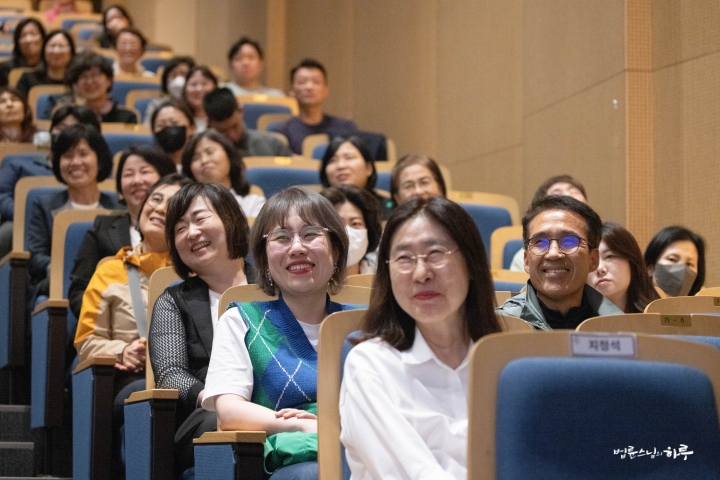
This has already happened, so there’s no need to dwell on thoughts like “I wish this hadn’t happened.” If you bought stocks for $10,000 and now they’re worth $8,000, you need to think about what to do next. If you bought a new car called “husband” and it got scratched and became a used car, you can decide whether to repair it or sell it and buy another used car. That woman ultimately took the husband who had been living with you. If your husband wasn’t originally having an affair with her, even though that woman is with him now, you haven’t lost anything. In fact, you’re in a much better position. You married him first, you have the legal rights, and you spent 13 years together. So there’s absolutely no reason for you to be shaken because your pride is hurt.
I once visited the home of a Buddhist man in America. When I visited his house, there was no trace of a wife, so I asked if he was unmarried. He replied, “I was married. I have a son too. But now I’m divorced.” When I asked why he divorced, he answered, “We lived together for 10 years and then separated. Among my friends, I had one of the longest marriages.” Hearing this, I felt that “culture has really changed a lot.” Relationships ultimately come down to how you perceive them. Having 13 years of memories is better than having none at all. If you cover the current situation with anger, all your past time will turn into regret. Isn’t it hurtful to your pride to keep staying with a husband who says he prefers another woman? From my perspective, you seem rather pitiful. I was curious about why you couldn’t separate, but from what you’ve shared, it’s because your husband took good care of you and you’re economically dependent on him. I completely understand why you feel this way when you’re living like a child being cared for by a mother.
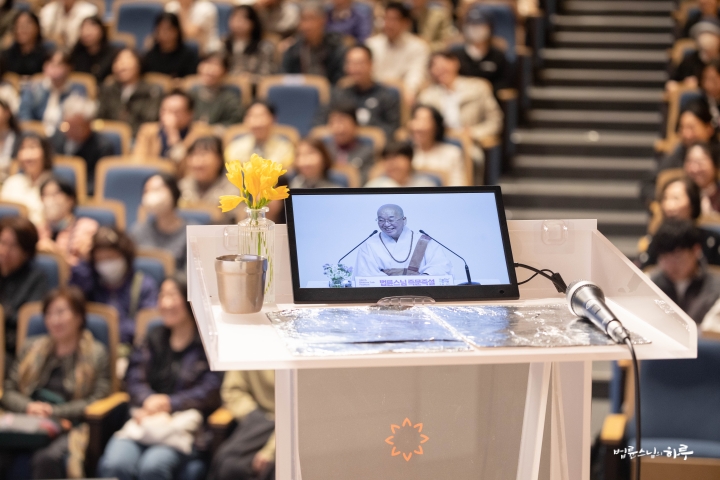
However, the best choice is to simply say, ‘Alright, thank you,’ and let them go with a smile. But if you want to gain even a small practical benefit, never bring up divorce first. Just quietly endure. Even if you want to scold him, wait until his relationship with that woman is completely over and he returns to you. That way, he has nowhere to escape, and you maintain control. The same applies to negotiations. Your husband will certainly propose compensation terms. Never accept his attempt to end things easily by saying, ‘We have a child, just give me a divorce.’ You still have more compensation to receive. So don’t be swayed by emotions now; respond rationally and wisely.”
“Actually, my husband has already started negotiating. He’s offering me the apartment we’re living in, which is in his name, and says he’ll continue providing living expenses for the next two years. His only condition is that I agree to the divorce. At first, I told him, ‘I don’t want a divorce. Leave if you want, but I won’t divorce you.’ After that, he became so cold he wouldn’t even make eye contact with me, and it was emotionally draining. Still, I tried to stay positive, saying, ‘Since we’re still living together, let’s try to get along while we’re here.’ But honestly, I’m so exhausted that yesterday I finally said, ‘Since you’re suffering so much, I’ll consider the divorce.’ It was incredibly difficult to say those words, but ultimately it’s my burden to bear. I’d like to receive a prayer from you, Sunim. I hope doing 108 bows daily will bring some peace to my heart.”
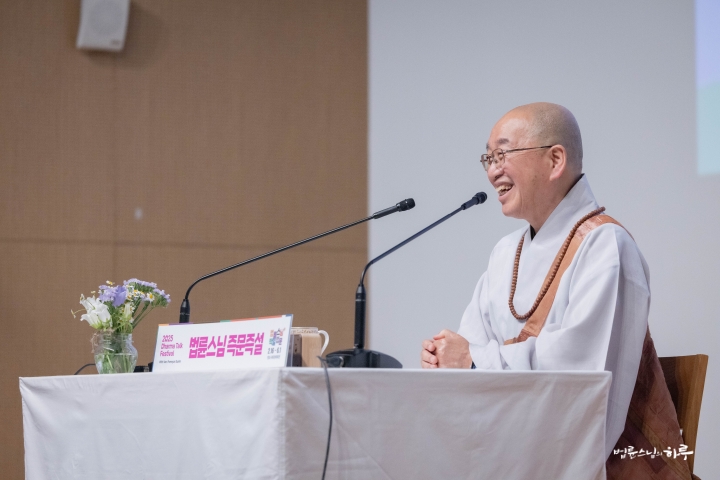
“From today, pray: ‘Buddha, this is nothing.’ From what I hear, it’s really not a big deal. Just let it be. If he comes home, he comes home. If you don’t see him, you don’t see him. If he leaves, he leaves. There’s no need to feel bad about it. Just smile and say, ‘Why are you angry with me for something you did? Isn’t that ridiculous?’ Continue your daily routine—prepare meals, maintain conversation with humor. Keep repeating to yourself, ‘This is nothing,’ as you pray. If he truly wants to leave and offers sufficient compensation, then you can say, ‘Alright, since you want this so badly, I’ll let you go.’ Suffering while trying to hold onto someone is childish.”
“Yes, thank you.”
“In most cases, people start dating and eventually marry because the other person treats them well. But relationships that begin for this reason rarely last long. When ‘being treated well’ becomes the standard, disappointment follows when expectations aren’t met in real life together. Such relationships are like eating a beautiful flower that contains poison—lovely on the outside, but toxic when consumed.
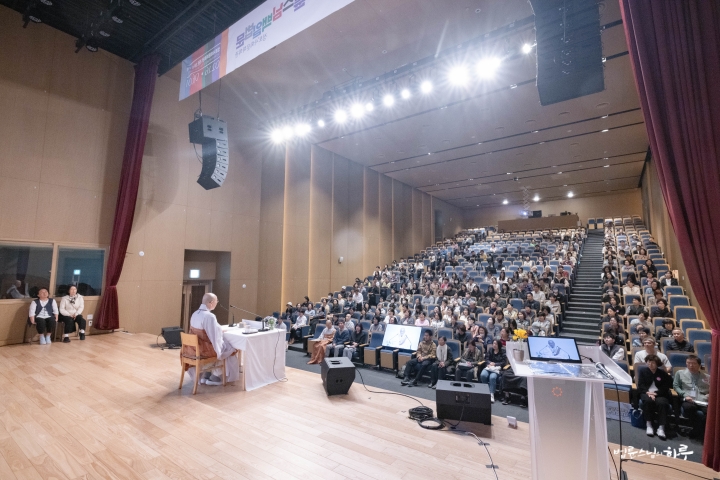
That’s why knowing too much about these principles can lead to living like me. It’s better not to know too much. Not knowing allows you to be deceived with blinded eyes, and while it can be painful, that’s what makes life interesting. Adjusting to each other, breaking up, feeling lonely, falling in love again—this is what life is about. That’s why I don’t worry much about worldly matters. Today you laugh, tomorrow you cry; today you cry, tomorrow you laugh again. It’s always like that. What I want to tell you is that it’s not a big deal.
If you break down first, you become the weaker party. But if you maintain your composure, you become the stronger one. You gain control. Your husband created this situation, yet you’re the one walking on eggshells and feeling anxious. This is because you’ve been young, foolish, and dependent. If anger gets mixed in, you’ll end up becoming enemies, losing everything, and falling behind in life.”
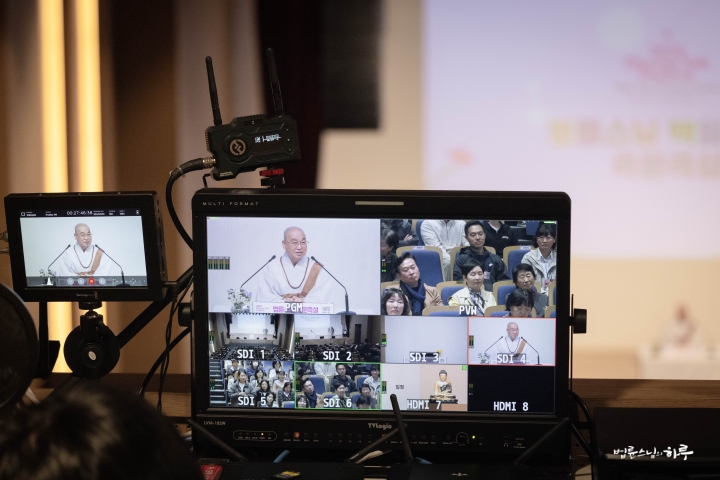
“Before I asked my question, I was really struggling and found it difficult to accept the situation. But when you told me it wasn’t such a big deal, it was truly comforting. Your words about how a relationship that only involves receiving cannot last long also resonated deeply with me. I’ve now decided to stop acting like a child and live more courageously. Thank you.”
“In times like these when birth rates are so low, having another child in the world is not a bad thing but a good thing. If that woman wants to have and raise the child, just let her be. However, if you also want the child, you can negotiate with your husband and make this generous proposal:
‘I’ll raise the child. In exchange, end your relationship with that woman and transfer the apartment to her name. I value you more than the apartment.’
If your husband says he absolutely cannot do that, then you need to let him go. In this free world, it’s not right to put a rope around someone else’s neck and try to control them. Everyone has the right to live their own life.”
“Thank you. I understand now.”
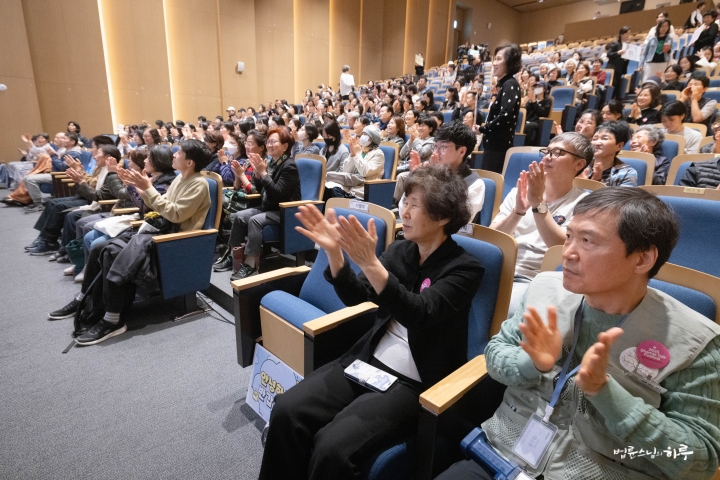
The questions continued.
I’m raising a child alone and periodically experience negative thoughts. How can I live with a more positive mindset?
I’m planning to change jobs, but I feel indebted to my colleagues who sent condolence money. How can I resolve this feeling of indebtedness before I leave?
After addressing three questions, it was time to conclude. Though it was regrettable, the Dharma Q&A ended at noon.
Sunim had lunch with the Sangha in the dining hall on the first basement level. After finishing the meal, at 1 PM, he met with visitors who had come to The Peace Foundation.

After the meeting, at 3 PM, Sunim headed to Korea House in Jung-gu, Seoul, to attend the book launch ceremony for “Donghak Manri.”

Recently, Yeom Sang-cheol, a Cheondoism leader, had visited Sunim to request a congratulatory speech at the “Donghak Manri” book dedication ceremony. “Donghak Manri” is a travelogue documenting visits to Donghak and Cheondoism historical sites across the country over the past 20 years, following the footsteps of Suun Choe Je-u and his successor Haewol Choe Si-hyeong. Sunim, who has always deeply respected Suun Choe Je-u, gladly accepted the invitation.
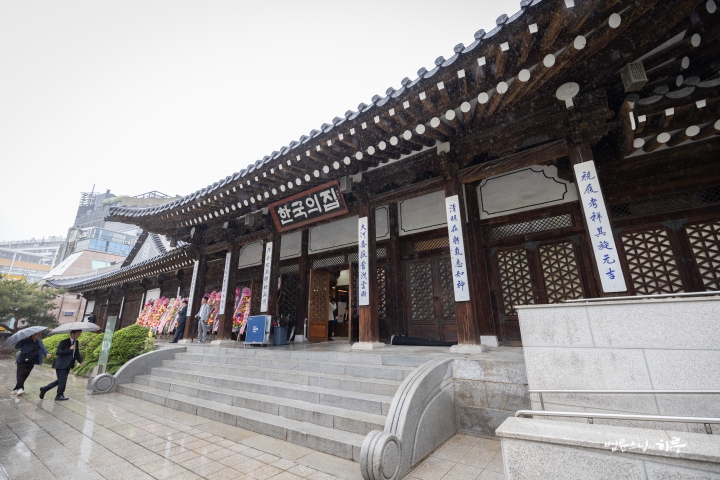
When Sunim arrived, Yeom Sang-cheol warmly welcomed him.
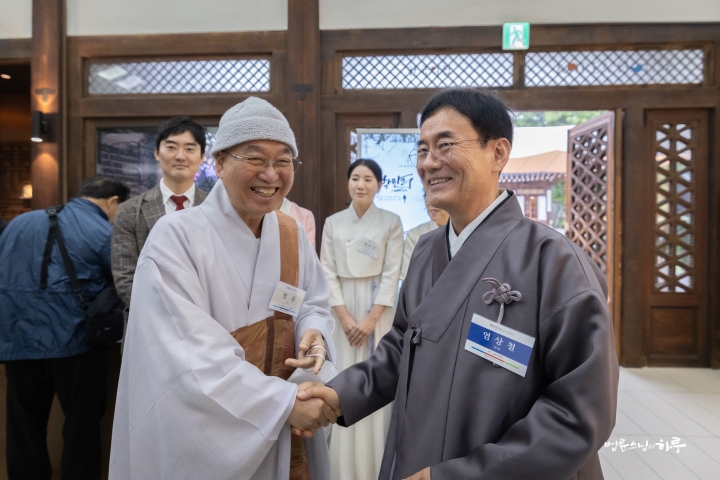
After a brief tea gathering, the book dedication ceremony began at 4 PM. Unlike a typical book launch, a book dedication ceremony in Cheondoism tradition is a ritual of “bonggo” (奉告), which means reporting and offering the published book or document to the founder and ancestors of Cheondoism.
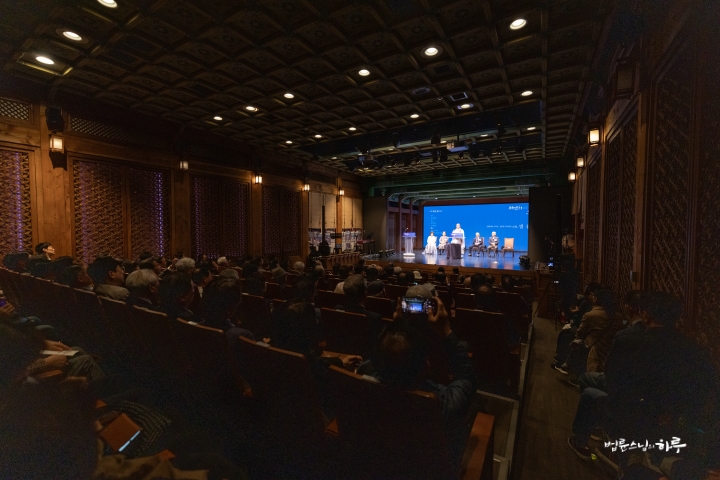
Following Cheondoism rituals, they performed the Cheongsu Bongjeon ceremony, offering clear water to show respect to heaven and convey sincerity, followed by Simgo (silent prayer) and a progress report. Then they conducted the book dedication ritual, expressing their sincere gratitude and appreciation with the book to Hanulnim (the Lord of Heaven), and presented flowers.
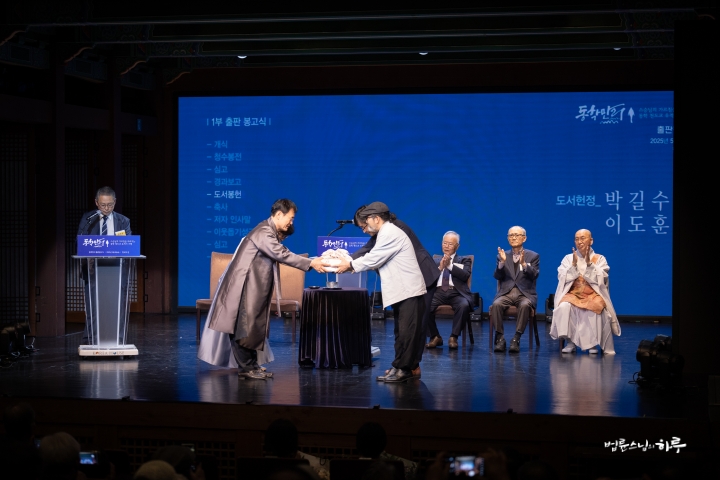
After a congratulatory speech by former Cheondoism leader Yoon Seok-san, Sunim took the stage to deliver his congratulatory remarks.
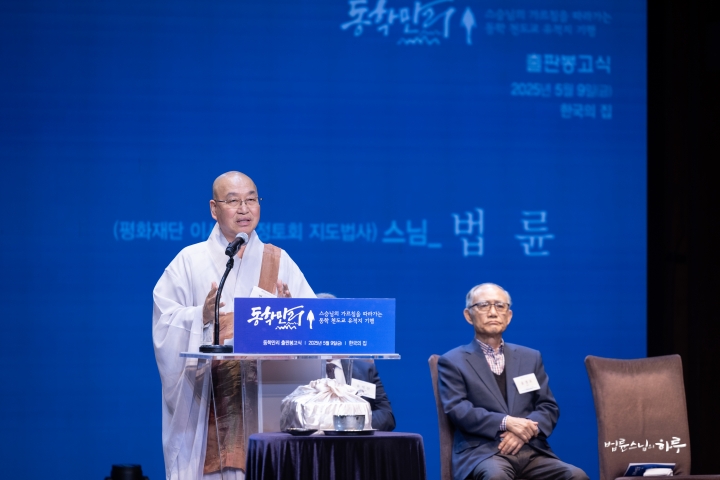
“First, I sincerely congratulate Yeom Sang-cheol on the publication of ‘Donghak Manri.’ As a practitioner following the Buddha’s teachings, I have spent the last 30 years traveling throughout India to verify the places where Buddha’s traces remain and what teachings were given there for my book ‘Following Buddha’s Footsteps.’ Therefore, while reading ‘Donghak Manri,’ I could understand how much effort and devotion went into this book. This is not merely a book but a path of pilgrimage and practice. Once again, I deeply thank you for your hard work and sincerely congratulate you on this publication.
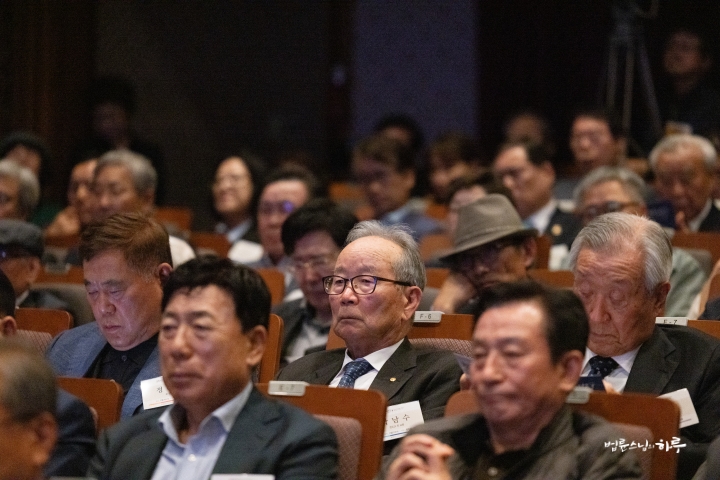
I was born in Ulsan and attended school in Gyeongju. Since my family name is also Choe from Gyeongju, I was familiar with the birth, spiritual journey, and historical sites of Great Master Choe Je-u in Gyeongju, but I wasn’t well acquainted with the historical sites in Ulsan where I was born. After being asked to give this congratulatory speech and reading the book in advance, I felt that I should definitely visit the historical sites in the Ulsan area the next time I go to my hometown. So I thank you once again.
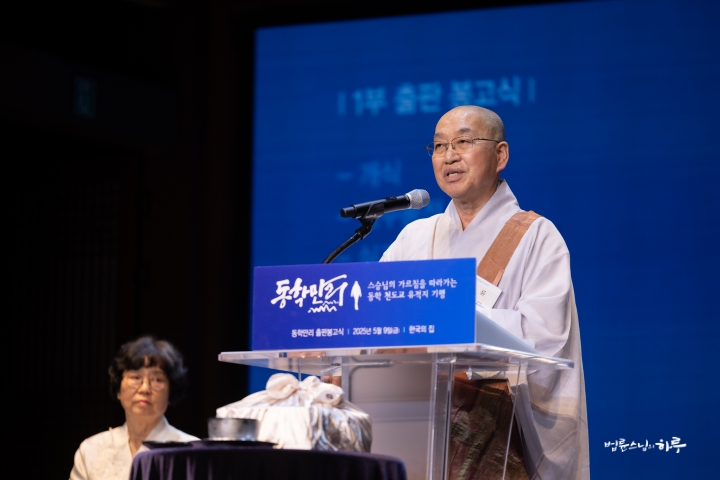
Why We Must Remember Cheondoism, the Root of Today’s Republic of Korea
I hold a sense of indebtedness toward Cheondoism and Donghak that goes beyond mere neighborly religious respect—I feel this as a citizen of the Republic of Korea. This is because the root of today’s Republic of Korea is the Provisional Government in Shanghai, whose foundation was the March 1st Independence Movement, which itself was rooted in the Donghak spirit of Cheondoism. While it’s said that Cheondoism, Buddhism, and Christianity jointly participated in the March 1st Independence Movement, Buddhism and Christianity’s involvement was limited to the participation of individual monks and pastors. In contrast, the entire Cheondoism organization took responsibility for all financial support and preparations. Consequently, while Japanese oppression affected only certain individuals in Buddhism and Christianity, Cheondoism suffered as an entire religious organization. I believe this became the first reason for Cheondoism’s struggles today. The second reason is that when Korea was divided into North and South, many citizens experienced the pain of separation, and Cheondoism likewise suffered the agony of organizational division. I think these factors contributed to Cheondoism’s decline into a minority religion today.
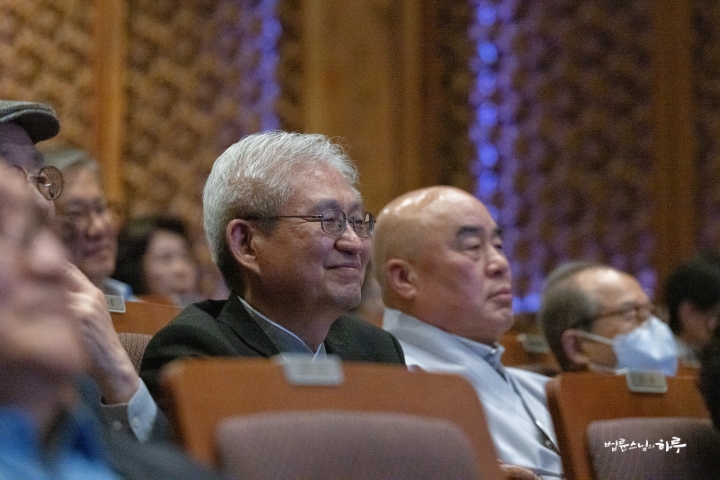
Considering Cheondoism’s influence on our history and people, I believe that regardless of religious affiliation, every citizen of the Republic of Korea should remember its contributions and accurately understand its history. However, today we seem to lack appreciation and gratitude for these contributions. I feel disheartened whenever I hear narratives suggesting that the Republic of Korea exists without acknowledging Cheondoism’s contributions. If the Republic of Korea is to be a proper nation, it must maintain an attitude of gratitude toward the contributions of our ancestors. Living in a reality that fails to do this, I constantly carry a debt in my heart, and my presence here today stems from my desire to repay at least a small portion of that debt.
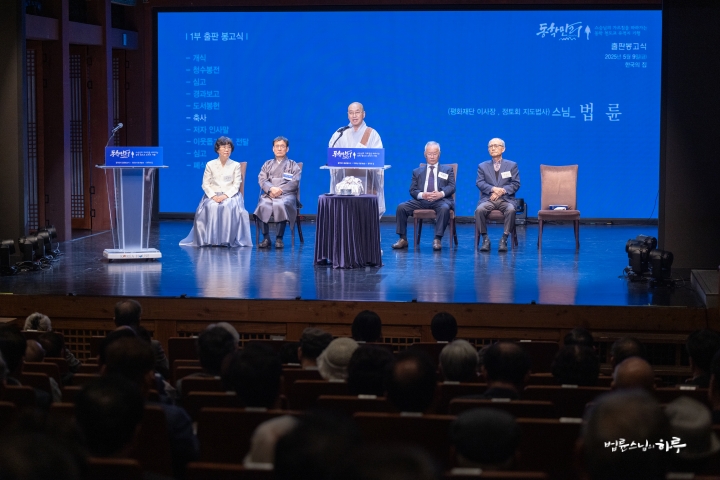
The book ‘Donghak Manri’ is edited with large text, big photos, and a very reader-friendly layout to make it accessible to everyone. I sincerely thank you for your efforts. I hope this book will inspire our citizens to develop a deep interest in Donghak and Cheondoism, regardless of whether they are followers of Cheondoism or not.”
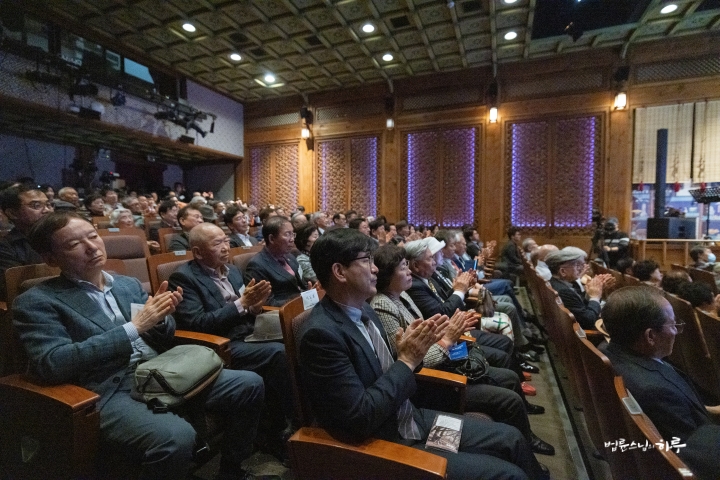
Following President Yoon Kyung-ro of Hansung University’s congratulatory remarks, the author, Yeom Sang-cheol Seondosa, gave his greeting.
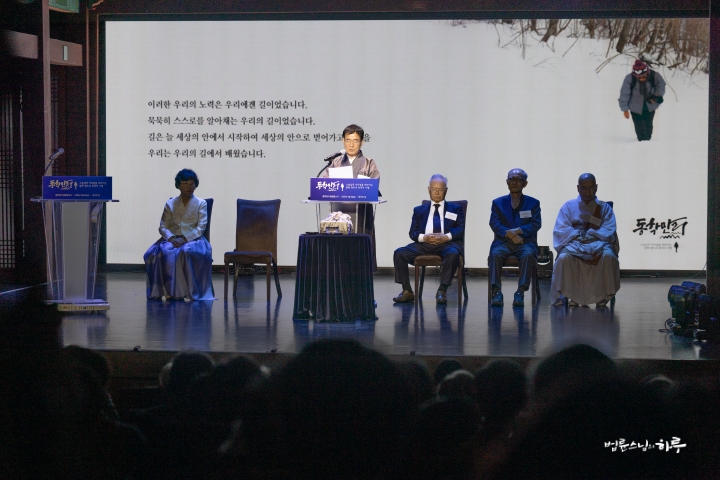
“The title of the book is ‘Donghak Manri.’ ‘Donghak’ represents the spiritual source of life, and ‘Manri’ means to read ten thousand books, walk ten thousand li (a traditional unit of distance), and meet ten thousand people. For me, ‘Dowon Giseo’ provided teachings comparable to ten thousand books, and I wrote ‘Donghak Manri’ by walking ten thousand li through the places and times within that book. I sincerely hope that the teachings of the past will breathe again in today’s life, and that the path we walk together will become new hopeful footprints for the next generation.”
After this, a scholarship and donation ceremony was held to commemorate the publication, followed by a commemorative photo session, concluding the book launch ceremony.
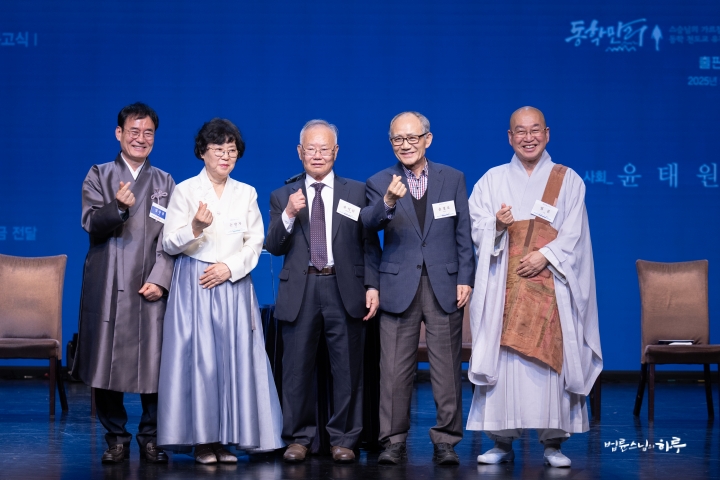

After leaving the venue, Sunim moved to another location to have tea with Mr. Kang Dae-in, Honorary Director of the Dialogue Culture Academy.
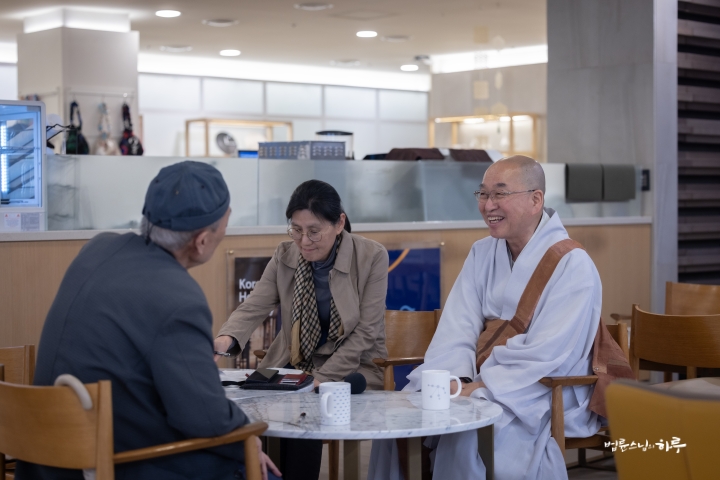
Director Kang expressed deep concern about the increasing division in Korean society and suggested operating a YouTube broadcast program for the next three years to promote national unity.
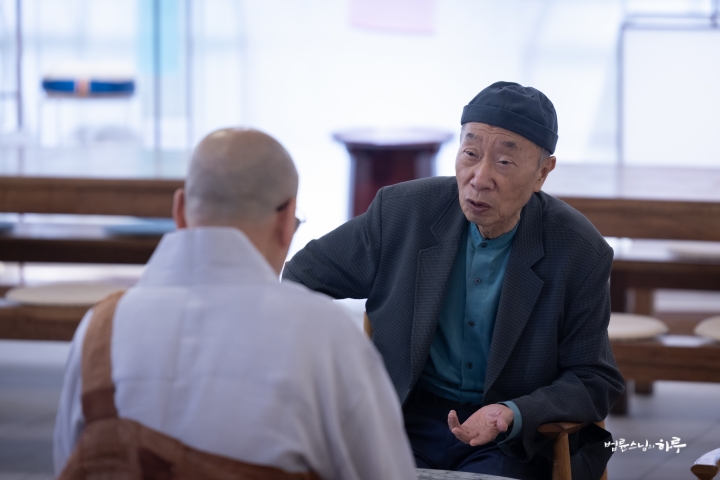
“Sunim, how can we allow Korean society to be so severely divided? I think it’s time to nurture a moderate group that can heal this divided society. I’ll serve as the producer, so I’d appreciate if you could play a role as well.”
“Yes, I understand. If you plan the project, I will support the broadcasting aspect.”
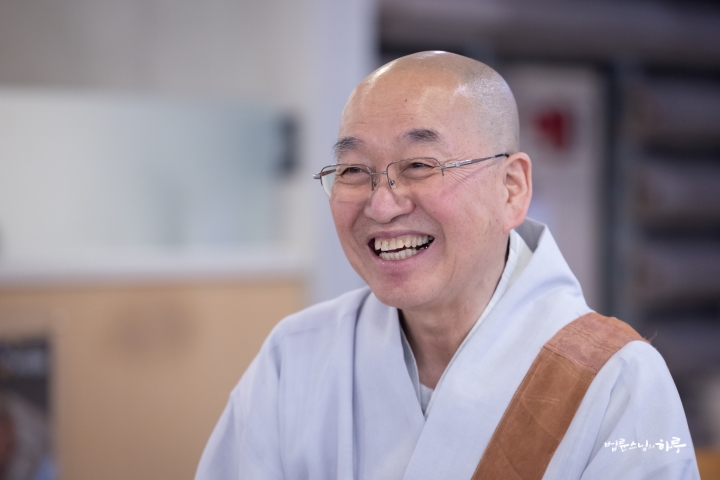
They agreed to continue their discussions and promised to meet again.

As the sun set, Sunim returned to the Jungto Social and Cultural Center. After a light dinner in the basement dining hall, he headed to the main auditorium for the Friday Dharma Q&A session.
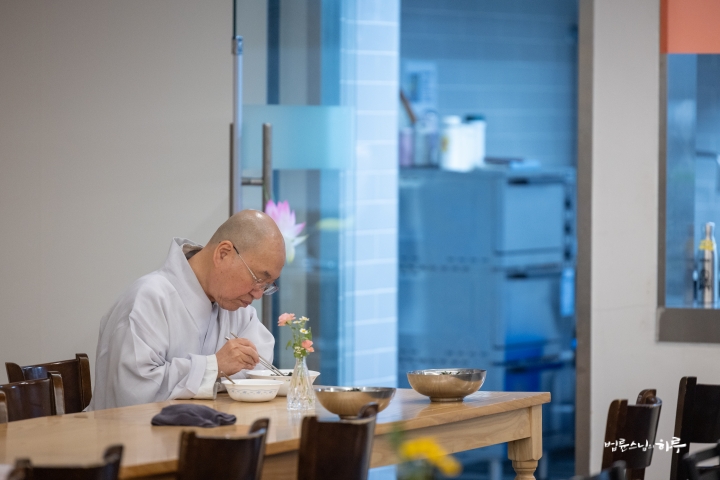

Many citizens came to the Jungto Social and Cultural Center after work to attend the Dharma Q&A. About 5,100 people connected via YouTube, and around 140 people were present at the venue.
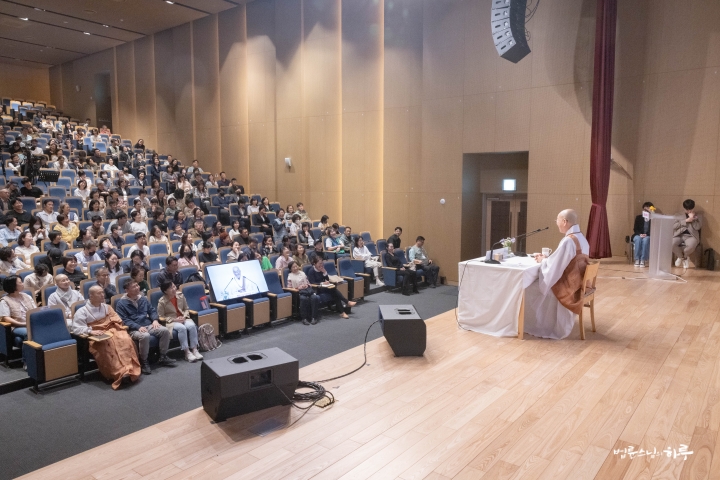
After reciting the Three Refuges and Words for Practice, Sunim took the stage. During the hour-long session, seven people raised their hands to engage in conversation with Sunim. One person sought advice about her husband’s harsh discipline of their high school senior son, fearing it might escalate into a serious conflict between father and son.
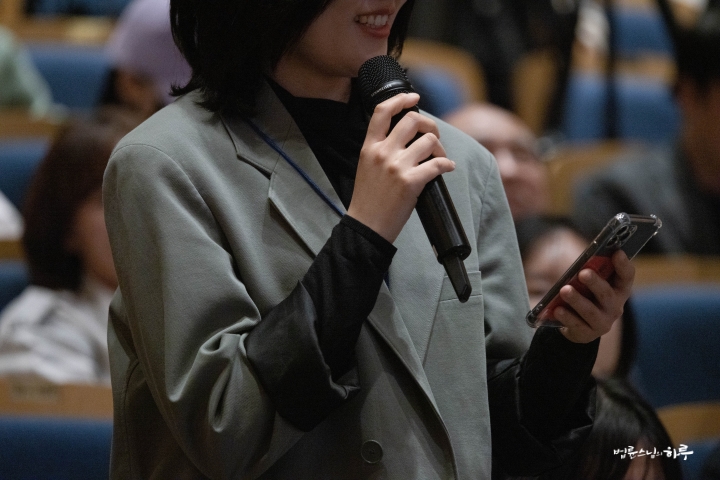
How should I handle my husband who severely disciplines our high school senior son?
“Is he your firstborn?”
“Yes.”
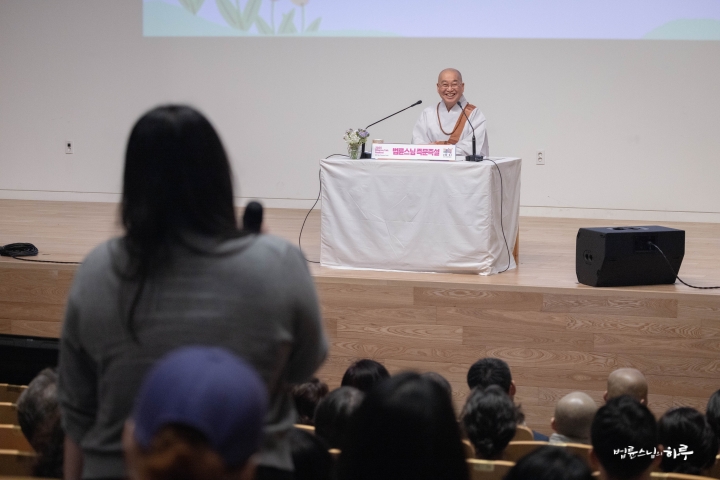
“First, take your son to a psychiatrist. Explain his condition to the doctor and get a diagnosis. If he’s diagnosed with depression or a mental health issue, follow the prescribed treatment. Don’t suffer alone with this problem. Only after the hospital confirms there’s nothing specifically wrong with your son can you begin a dialogue. If he has an illness and you push him, he won’t be able to handle it. It’s like forcing someone with an injured leg to bow. Bowing is good, but you can’t yell at someone with an injured leg saying, ‘You’re young, can’t you even do that?’ You need to first ask why they can’t do it. If they say their knee hurts, you should get an X-ray or MRI to check. If there’s nothing wrong, it might be a psychological issue that needs a different approach. You could say, ‘It might be difficult, but would you like to try together?’ and work on overcoming it together. But if you tell someone who is genuinely in pain to just overcome it, their condition will worsen.
The same applies to your son. Normally, even if students play around in their first or second year of high school, they start studying seriously in their senior year. It’s also common for parents to scold their children. Most children feel upset for a day or two after being scolded but then resume studying. The problem is that your son has remained dejected for a long time. He likely has psychological issues. That’s why I suggest getting a medical examination first. If there’s a condition, it can be treated, and if not, that’s fortunate.
If it’s not a medical condition, you can start a conversation with him. Ask, ‘If you dislike studying, are you thinking of not going to college?’ If he says, ‘I want to go to college,’ then respond, ‘Then don’t you think you need to study even if you don’t like it?’ Let him make his own choice. It’s not about telling him to study or not to study, but respecting his wishes and giving him the freedom to choose.
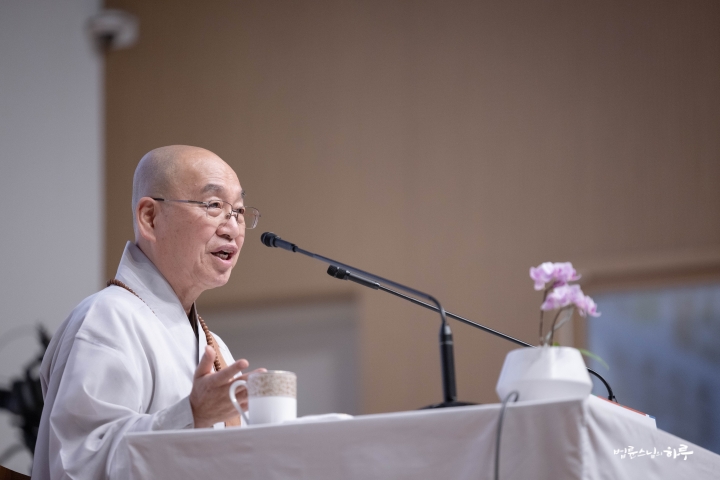
If the hospital says your child has a mental illness or psychological problem, you need to talk with your husband. Say something like, “Honey, the hospital says our child has a mental disability. They said that constantly pressuring him could make his condition worse.” Don’t accuse your husband of using the wrong approach, but explain that your child cannot handle the pressure right now and suggest focusing on treatment for the time being. Rather than arguing about who’s right or wrong, it’s important to first understand why this problem occurred and find a compromise. First, get a medical examination, and second, if treatment is needed, pursue that; if not, start having conversations with your child.
Also, if you take your child and leave home, there’s a high possibility your husband will have an affair. When a man lives alone, it becomes easier for another woman to enter his life. It’s like when you draw a bucket of water from a well, it soon fills up again—that’s just how the world works. So you need to approach this wisely. The Buddha said, “Though you may be struck by the first arrow, do not be struck by the second.” When problems arise, you should examine the root cause and solve it, rather than responding foolishly and making things worse. You need to keep your wits about you.
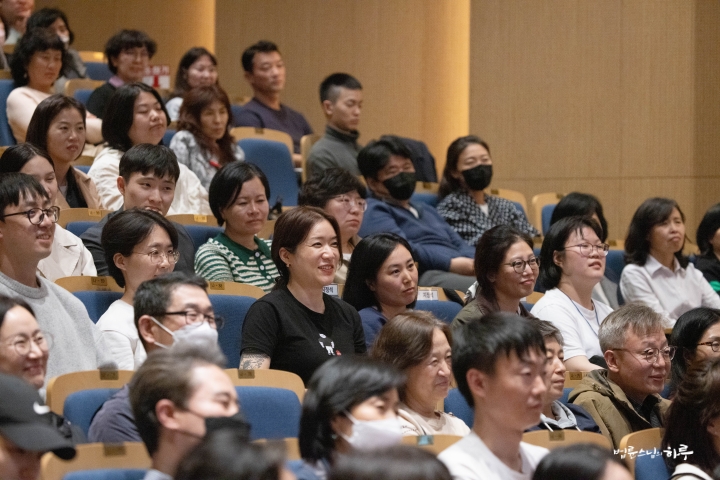
Actually, it’s not a big deal. Problems arise as we go through life. Our country’s recent political situation is similar. One night as I was trying to sleep, martial law was suddenly declared, and when I woke up in the morning, it had been lifted. The president was detained, and after sleeping, I found out they were released. This is how life always is. If we get swept away by every change in the world, we’ll be too overwhelmed to live. Yesterday it felt completely like summer with temperatures reaching 25 degrees, but today the temperature suddenly dropped, making us shiver. In such cases, you just need to put on an extra layer of clothing.
So first, take your child to the hospital. Once you get a diagnosis, respond accordingly step by step. Leaving home should be the very last option. There’s a saying that ‘if your head isn’t smart, your body suffers.’ From what I’ve heard, you seem to be acting somewhat foolishly. Your child is actually doing well considering the circumstances. I hope you’ll respond more wisely.”
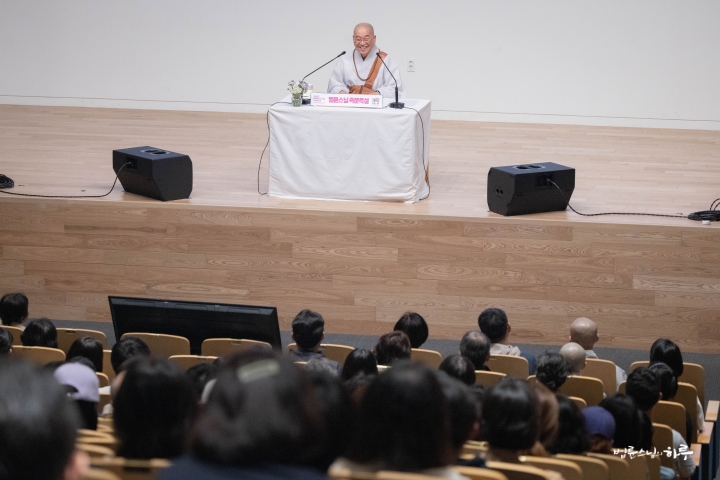
“Yes. Thank you. As a mother, I was thinking of leaving home because I put my child before my husband. But listening to Sunim, I realized, ‘I was letting worry and anxiety take over!’ I’ll go to the hospital first and think things through slowly.”
The entire audience applauded loudly to encourage the questioner.
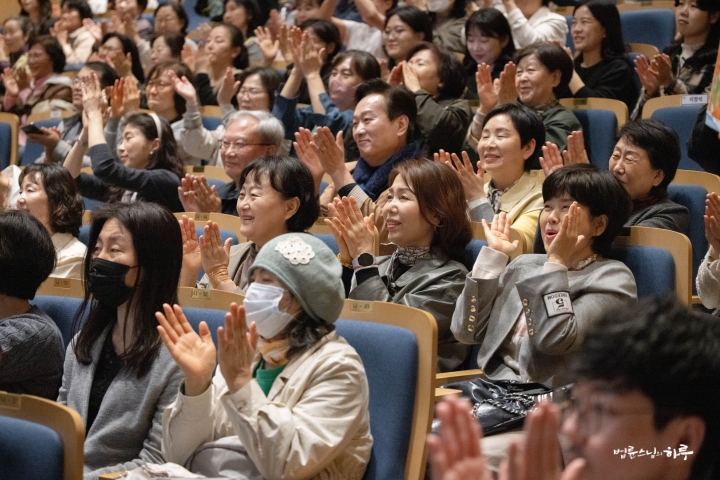
The questions continued to flow.
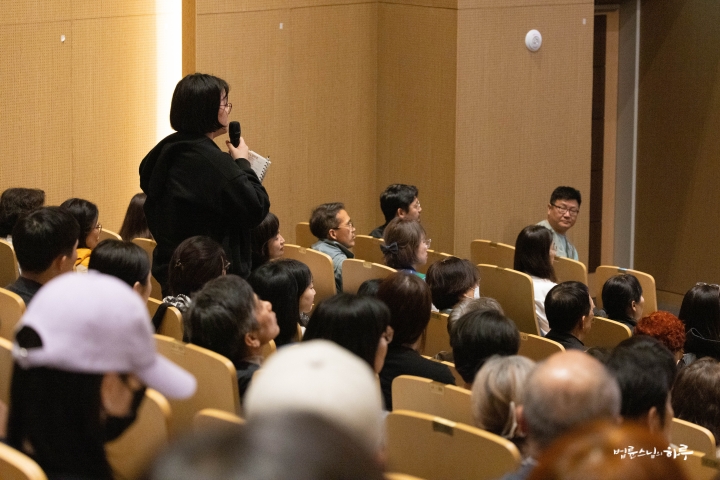
I consider myself a Christian Buddhist, accepting parts from both Christianity and Buddhism that suit me. Is this approach to faith selfish?
Having survived three near-death experiences due to intractable epilepsy, my only remaining goal is enlightenment. How should a lay practitioner in my situation practice?
I can’t accept that I’m the only one at my company who didn’t receive a raise. How can I both get a salary increase and do well at work?
I think I have severe narcissism. I waste a lot of time looking at videos and photos of myself every day.
In Buddhism, they say it’s difficult to be born as a human, yet the world we’re born into is the suffering-filled Saha world. This feels contradictory to me.
I’m a 30-year-old office worker with high anxiety. I feel I could do well in agriculture. What would you recommend?
By the time the conversation ended, it was almost 9 PM. Sunim concluded the talk with the Four Great Vows, promising to meet again at the same time next week.

After leaving the lecture hall, Sunim immediately departed Seoul for Dubuk Retreat Center.

After traveling on the highway for 3 hours and 30 minutes, Sunim arrived at Dubuk Retreat Center at 12:30 AM and concluded his day.
Tomorrow, Sunim plans to work with about 100 volunteers at the Dubuk Retreat Center farm, harvesting onions, weeding, and gathering mugwort.”





